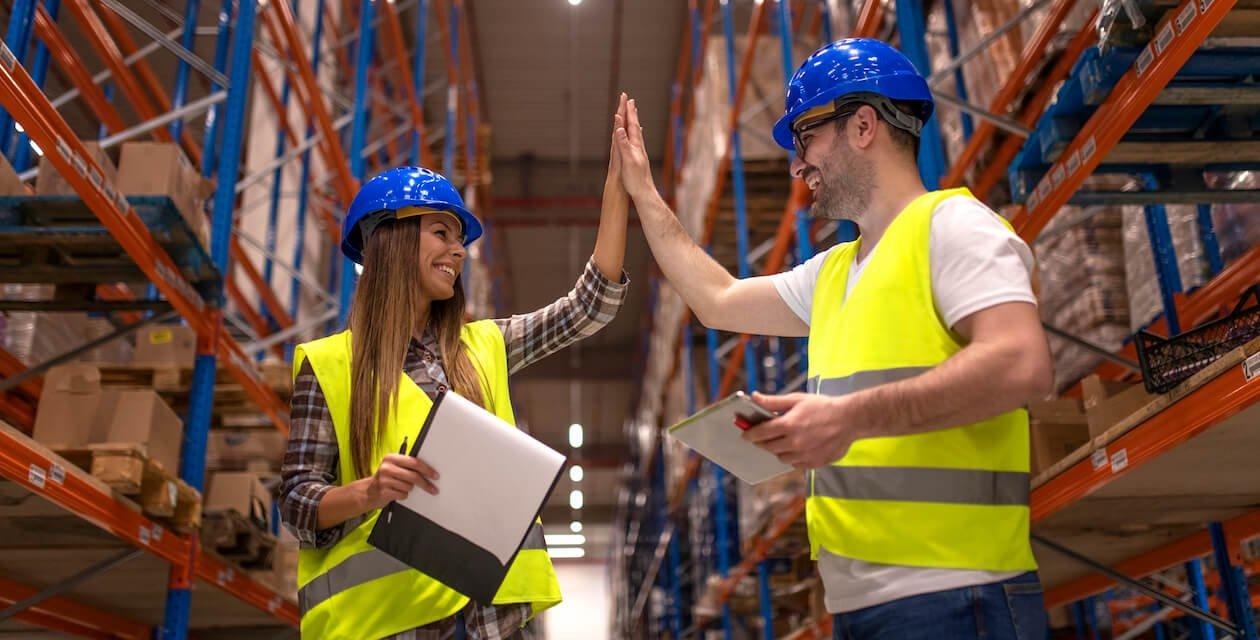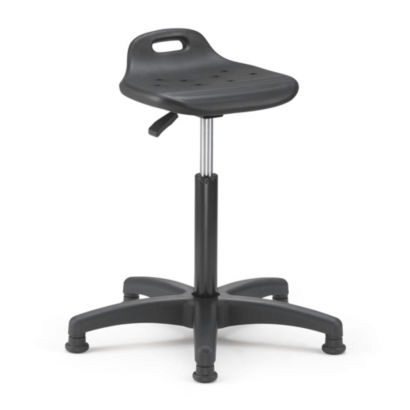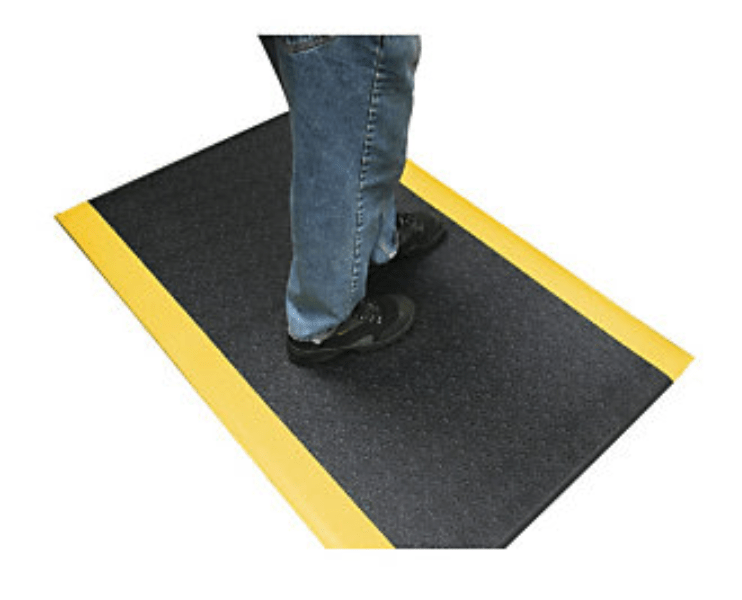April 7 is World Health Day. What if this was an opportunity for you to take stock of the health of your employees in your logistics centre?As a logistics manager, providing good working conditions for all your operators is no longer just a legal obligation. It has become the spearhead of their productivity and the attractiveness of your company. Paying attention to their health allows you to
- generate more motivation in your logistics team and therefore more efficiency;
- reduce the rate of absenteeism in the warehouse, for greater productivity;
- reduce the turnover of your teams, to increase the loyalty of your employees;
- improve your employer brand and make your logistics jobs more attractive.
découvrez dans cet article les clés pour assurer la santé dans votre pôle logistique, grâce aux équipements et aux bonnes pratiques qui favoriseront la qualité de vie dans votre entrepôt.

Facilitez la manutention dans l’entrepôt
Vous le savez bien : la manutention est l’une des activités de l’organisation logistique qui est responsable de bon nombre de soucis de santé et notamment de Troubles Musculo-Squelettiques (TMS). Lorsque vos opérateurs procèdent à l’entreposage et au déplacement des charges, souvent lourdes, ils font des gestes répétitifs qui créent des tensions significatives sur leur corps.

Heureusement, il est tout à fait possible de limiter ces risques de maladies professionnelles, en adoptant les équipements de manutention adaptés. Ceux-ci fluidifient cette phase cruciale de la supply chain
 |
Hand trucksare essential to ensure health in your logistics centre. Some are specifically designed to reduce the risk of RSI when moving heavy loads. They are notably equipped with closed handles that allow the logistician to adapt the position of his or her hands, and with star wheels that make it easier to overcome obstacles. To choose this equipment properly, do not hesitate to consult our article “Choosing your handling truck in 7 key criteria”. |
 |
Constant level trucksthanks to their platform, which remains at the same height whatever the load placed on it, they keep the products at the same level at all times, which is essential to help your operators during the picking and transport of goods in the warehouse. |
 |
Manual lifting tablesthey considerably reduce the risk of RSI, as they allow the operator to adapt the height of the work table to his own height. The table is lifted by a hydraulic pedal, which is very ergonomic, without the need to overtax the body. |
 |
Pallet trucks are necessary if your transport and logistics division palletises products. They should be chosen according to the lifting height you need and the type of goods you are palletising (their weight, fragility, etc.). Available in manual or electric versions, these handling machines can more or less limit the strain on your order pickers’ muscles. To select the appropriate equipment, see our article “How to choose a pallet truck”. |
 |
Rollsthese are ideal for helping the order picker to pick up products in the warehouse without too much effort, making it easier to manage the physical flow in the warehouse, so that logistics teams are protected from carrying the heaviest loads. |
to discover all the logistics equipment that can help your operators during the handling phase, discover the RAJA handling and load transport products.
Make your operators’ packing station more ergonomic
The second key moment when your logistics operators potentially risk their health is during the order preparation phase, particularly at their packing station. The logistics operations that take place there are repetitive and if the work station is not optimised, your preparers may also have to use their bodies to grab the tools and/or instruments they need. But here again, it is entirely possible to make this key area ergonomic and combine logistics and health. To do this, make sure that
 |
Place the different elements and equipment on the packing station, according to how often they are used. For example, on the table itself, at operator height, you will place label printers, wrapping paper dispensers, as well as bins containing the small tools they may frequently need. On the top shelf, you will find flat cardboard boxes, which can be picked up without too much effort. Need to dig deeper into the subject? Consult our article “How to choose your packing station and table? |
 |
Install sit-stand stools at each workstation. The principle is simple: they allow your pickers to sit down from time to time, to avoid overtaxing their legs and back muscles. |
 |
Anti-fatigue mats at every workstation. These help your operators to keep their feet, legs and backs healthy when they have to stand for long periods of time. The design of these industrial mats encourages your order pickers to keep their feet moving, even when they are doing static work. Thanks to these small movements, they prevent the onset of pain when standing for long periods. |
fight against MSDs during the palletising phase
Palletising, with the handling of heavy loads and the repetitive movements that result from it, is probably the activity that exposes logisticians to the greatest risk of MSDs. It has been noted in particular that service providers in charge of manual palletising often suffer from a shoulder problem (rotator cuff). Do not hesitate to equip yourself with equipment that facilitates palletising in your logistics department
 |
If you opt for manual palletising, make sure you choose pre-stretched palletising filmsthey are lighter than traditional films and can be applied effortlessly thanks to their easily stretchable material and their sticky inner side. |
 |
For manual palletising, it can be useful to purchasea manual or semi-electric stacker. Its purpose is to effortlessly lift goods onto pallets, so that operators can position palletisable boxes without having to bend down or lift their arms too high. |
 |
Finally, from a certain palletisation rate, it may be worthwhile to equip yourself with a banding machine or a banding robotthese machines, available either for purchase or hire, will automate all or part of the pallet wrapping process. This will give you greater logistical security, but also increase the rate of packaging. And because this type of equipment requires you to ask yourself the right questions, don’t hesitate to read our article “How to choose a wrapping machine”. |
train your operators in health reflexes in logistics
Beyond stock management, supply chain management or the management of supplies and your carriers, you are also responsible for training your operators in good practices that will enable them to stay healthy while carrying out their daily logistics activities. Of course, it is crucial to train them in the use of the equipment you provide them with. But, for the sake of safety in the warehouse, make sure that you also provide them with training in
- Actions and postures to be acquiredthe company has developed a range of ergonomic tools that allow them to adopt best practice in all their warehouse operations.
- Muscular awakeningin addition, the “How to choose a wrapping machine” course will enable them to adopt the best ergonomic practices in each of their operations in the warehouse, to warm up their bodies before they start working and to significantly improve their working conditions.
it is clear that health in logistics is not only physical. It is also essential to take a close look at the mental health of employees. Since the Covid-19 crisis, this has been put under even greater strain, as the pace has increased in many e-commerce warehouses and the mental health of many individuals has been weakened as a result. This is a good reason for you to round off this World Health Day by reading our article “How to improve wellbeing in your warehouse.”















